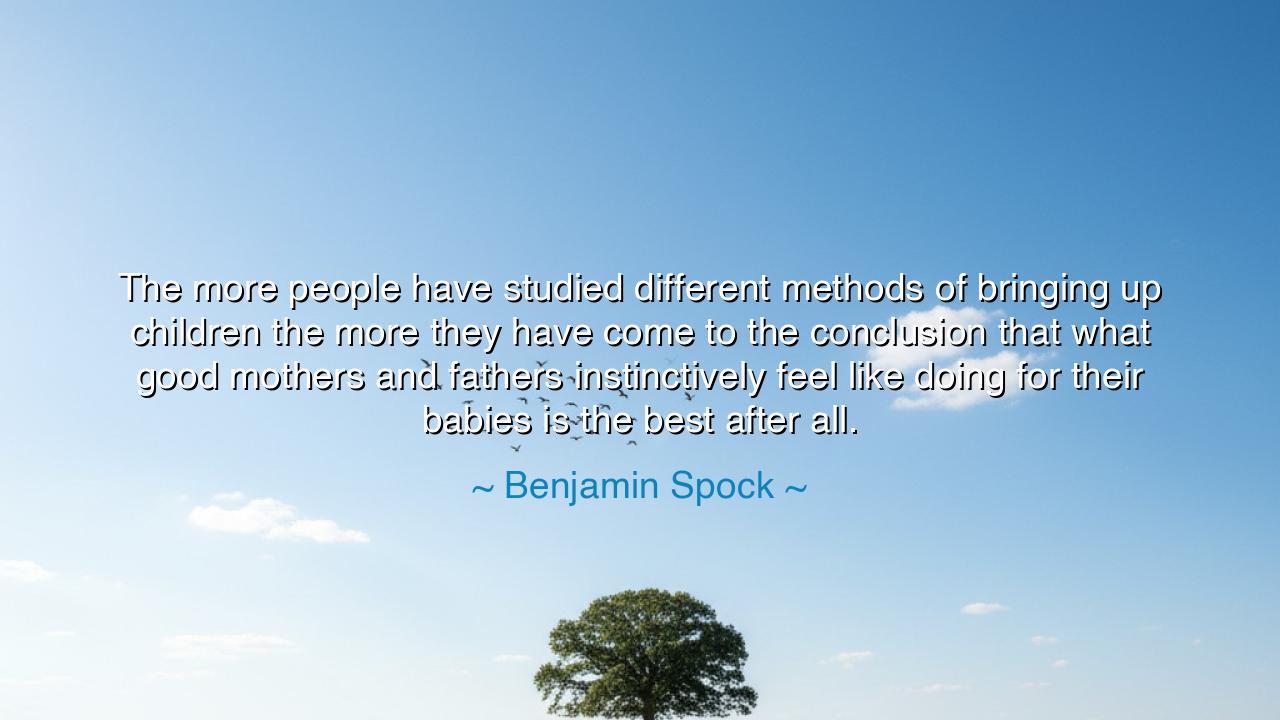
The more people have studied different methods of bringing up
The more people have studied different methods of bringing up children the more they have come to the conclusion that what good mothers and fathers instinctively feel like doing for their babies is the best after all.






In the words of Benjamin Spock, physician and teacher of parents across generations, there is wisdom that reaches beyond the science of his time: “The more people have studied different methods of bringing up children, the more they have come to the conclusion that what good mothers and fathers instinctively feel like doing for their babies is the best after all.” This is not merely medical advice, but a revelation of the sacred trust between parent and child, and the divine spark of instinct that guides the hand of love more surely than the calculations of the mind.
The ancients too understood this. Long before manuals, theories, or experts, parents nurtured their children by listening to the quiet voice within, the call of nature and the urging of the heart. The shepherd knew how to calm the cries of his infant; the mother knew how to rock the babe into peace. These instincts were not accidents, but part of the eternal wisdom breathed into the soul of humanity, that the weak may be protected and the helpless may find safety in the arms of love.
Consider the story of Cornelia, Mother of the Gracchi, in the days of ancient Rome. When asked to display her jewels, she brought forth her sons and declared, “These are my treasures.” She raised them not by scholarly formula, but by devotion, presence, and instinctive care. Though her sons became controversial reformers, the world never forgot the lesson of their mother: that children raised with love and attention surpass the finest gold. Her example embodies what Spock declares—that instinct born of love often surpasses the wisdom of scholars.
Yet Spock’s words do not deny the value of study or learning. They remind us, rather, that such study ultimately points back to what the heart already knows. Experts may argue about schedules, diets, or methods, but time and again they return to the same conclusion: the tender attentiveness of a loving mother or father is the greatest guide of all. Science, at its best, confirms what nature whispers—that care, responsiveness, and presence nurture the healthiest of souls.
There is also a heroic power in this truth. For in every age, parents are tempted to doubt themselves, to think they are unworthy or ignorant, to believe they must be trained by others before they can love rightly. Spock’s words break those chains of doubt, declaring that the instincts of love are not foolish, but wise. They are not to be dismissed as mere emotion, but to be trusted as the very compass placed within the human heart by nature—or by the divine hand itself.
The lesson, then, is clear: trust the instincts of love. When the baby cries, do not turn first to theories or manuals, but to the voice within that says, “Comfort them.” When the child is restless, listen not only to the counsel of strangers, but to your own bond of spirit. Knowledge has its place, but love is the greatest teacher. For what parent who truly loves their child would not sacrifice, comfort, and guide them? And what wisdom is greater than this?
Practical action flows naturally. Parents, honor your instincts, for they are sacred. Do not be paralyzed by the endless noise of opinions, but let knowledge serve as a tool, not a master. Hug your children often. Listen to their needs. Feed them not only with bread, but with affection, patience, and presence. Remember that every act of care—no matter how small—is a stone laid in the foundation of their future.
Thus, in the voice of Benjamin Spock, we hear not only the counsel of a doctor but the echo of ancient wisdom: that the bond between parents and children is holy, and that instinct, when born of love, is the truest guide. Let this teaching be handed down: though the world may study and theorize, the heart of a loving parent already knows the way. And that way, simple and pure, is often the very best of all.






AAdministratorAdministrator
Welcome, honored guests. Please leave a comment, we will respond soon